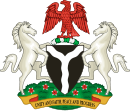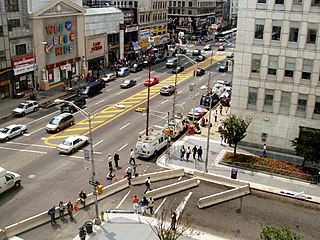This article needs additional citations for verification .(November 2016) |
| Part of a series on the |
| Culture of Nigeria |
|---|
 |
| Society |
| Topics |
| Symbols |
Mass media in Nigeria has an interesting and long history.
This article needs additional citations for verification .(November 2016) |
| Part of a series on the |
| Culture of Nigeria |
|---|
 |
| Society |
| Topics |
| Symbols |
Mass media in Nigeria has an interesting and long history.
Historically, Nigeria has boasted the most free and outspoken press of any African country, but also one which has consistently been the target of harassment by the past military dictatorships. Many agents of Nigeria press have been imprisoned, exiled, tortured, or murdered as a result, among them being Ogoni activist and television producer Ken Saro-Wiwa, who was executed for treason by order of the Sani Abacha dictatorship in 1995 (resulting in the expulsion of Nigeria from the Commonwealth of Nations and sanctions from abroad).
Even under the somewhat less-oppressive current civilian government, journalists have continued to come under fire, be it from the government (as with the June 2006 arrest of Gbenga Aruleba and Rotimi Durojaiye of African Independent Television under charges of sedition) or from other popular establishments (such as the self-imposed exile of this day's Isioma Daniel following the riots in Northern Nigeria over "sensitive comments" which she had made in an article regarding Muhammad and the 2002 Miss World pageant.
A fatwa calling for her beheading was issued by the mullahs of northern Nigeria, but was declared null and void by the relevant religious authorities in Saudi Arabia, and the Obasanjo faced an international public relations smearing (especially within journalistic circles) in the aftermath, which was not helped by the Amina Lawal controversy which had occurred prior to the riots, which had seen over 200 dead). However, as with most other countries, blogging has increasingly become a much safer, and much easier, conduit for Nigeria's growing Internet-enabled minority to express their dissatisfactions with the current state of affairs in Nigeria.
Brown envelope journalism in Nigeria is a practice whereby monetary inducement is given to journalists to make them write a positive story or kill a negative story. [1] The name is derived from cash inducements hidden in brown envelopes and given to journalists during press briefings. It is a common practice in Nigeria and many journalists do know that it is unethical. [2] One of the effects is that the Nigerian media has become a hotbed for sponsored stories.
Until the 1990s most publications were government-owned, but private papers such as the Nigerian Tribune , The Punch , Vanguard , and the Guardian continued to expose public and private scandals. [3] Laws related to the media, including newspapers, are scattered across various pieces of legislature. There are few good sources of discussion and analysis of these laws. [4]
An analysis of newspapers shows a strong bias towards coverage of males, reflecting prevalent cultural biases. Few articles discuss women and there are few photographs of women outside the fashion sections. [5] Although earnings have declined since the late 1980s the number of publications has steadily grown. As of 2008 there were over 100 national, regional or local newspapers. [3]
While newspapers (and, most recently, blogging) have long thrived in Nigeria, radio and television has not received as much recognition, due to limited resources and press restrictions which beset the establishment of radio or television services in Nigeria. However, such limitations have since been improved in order to reach larger audiences both within and without Nigeria, such as with the growth of satellite television. The BBC World Service as well as the Voice of America and the German broadcasting organization Deutsche Welle (DW) also provide shortwave radio in the Hausa language.
[ citation needed ]
| Position | Channel | Share of total viewing (%) |
|---|---|---|
| 1 | AM Family | 10.4 |
| 2 | AIT | 6.5 |
| 3 | AM Showcase | 6.0 |
| 4 | Silverbird TV | 5.4 |
| 5 | TVC Entertainment | 5.0 |
| 6 | M-Net | 4.9 |
| 7 | Galaxy TV | 3.3 |
| 8 | AM Yoruba | 1.9 |
| 9 | WAP TV | 1.4 |
| 10 | KAFTAN TV | 1.0 |
Virtually all Nigerian newspapers have an internet presence; in addition, there are several websites which are dedicated to allowing Nigerians to air their opinions on a variety of topics.
Journalism is the production and distribution of reports on the interaction of events, facts, ideas, and people that are the "news of the day" and that informs society to at least some degree of accuracy. The word, a noun, applies to the occupation, the methods of gathering information, and the organizing literary styles.
Media bias is the bias of journalists and news producers within the mass media in the selection of many events and stories that are reported and how they are covered. The term "media bias" implies a pervasive or widespread bias contravening of the standards of journalism, rather than the perspective of an individual journalist or article. The direction and degree of media bias in various countries is widely disputed.

The news media or news industry are forms of mass media that focus on delivering news to the general public. These include news agencies, newspapers, news magazines, news channels etc.
Journalistic ethics and standards comprise principles of ethics and good practice applicable to journalists. This subset of media ethics is known as journalism's professional "code of ethics" and the "canons of journalism". The basic codes and canons commonly appear in statements by professional journalism associations and individual print, broadcast, and online news organizations.
The media in Africa is expanding rapidly due to advances in telecommunications, especially mobile phones and the internet. In newspaper reporting, many Africans have won international media awards. In writing both prose and poetry, many awards have also been won by Africans, and Africa now claims a Nobel Laureate in Literature, Prof. Wole Soyinka of Nigeria.
Claims of media bias have increased in the United States as the two-party system has become more polarized, including claims of liberal and conservative bias. The bias generally manifests through media outlets skewing information, such as reporting news in a way that conflicts with standards of professional journalism, or promoting a political agenda through entertainment media. There is also bias in reporting to favor the corporate owners, and mainstream bias, a tendency of the media to focus on certain "hot" stories and ignore news of more substance. A variety of watchdog groups attempt to combat bias by fact-checking biased reporting and also unfounded claims of bias. Researchers in a variety of scholarly disciplines study media bias.

There are no current independent mass media in Eritrea. All media outlets in Eritrea are from the Ministry of Information, a government source.
Oríkì, or praise poetry, is a cultural phenomenon amongst Yoruba-speakers of West Africa.
Digital journalism, also known as netizen journalism or online journalism, is a contemporary form of journalism where editorial content is distributed via the Internet, as opposed to publishing via print or broadcast. What constitutes digital journalism is debated by scholars; however, the primary product of journalism, which is news and features on current affairs, is presented solely or in combination as text, audio, video, or some interactive forms like storytelling stories or newsgames, and disseminated through digital media technology.
Dele Olojede is a Nigerian journalist and former foreign editor for Newsday. He is a winner of the Pulitzer Prize for his work covering the aftermath of the Rwandan genocide. He serves on the board of EARTH University, in Costa Rica, and of The Markup, the New York-based investigative journalism organization focused on the impact of large tech platforms and their potential for human manipulation. He is the founder and host of Africa In the World, a hearts and minds festival held annually in Stellenbosch, in the Cape winelands of South Africa. He was a patron of the Etisalat Prize for Literature.
The mass media in Syria consists primarily of television, radio, Internet, film and print. The national language of Syria is Arabic but some publications and broadcasts are also available in English and French. While television is the most popular medium in Syria, the Internet has become a widely utilized vehicle to disseminate content. Transcending all available media, the government seeks to control what Syrians see by restricting coverage from outside sources. Publications and broadcasts are monitored by members of the government. All mass media outlets are under the supervision of the Ministry of Information. Third article of the 2013 Information Ministry guidelines stipulate that purpose of all media outlets is "to enlighten public opinion" in line with the ideological doctrines "of the Arab Socialist Ba’ath Party and the policy of the state".

News is information about current events. This may be provided through many different media: word of mouth, printing, postal systems, broadcasting, electronic communication, or through the testimony of observers and witnesses to events. News is sometimes called "hard news" to differentiate it from soft media.

Timothy Colin Harvey Luckhurst is a British journalist and academic, currently principal of South College of Durham University and an associate pro-vice-chancellor. Between 2007 and 2019 he was professor of Journalism at the University of Kent, and the founding head of the university's Centre for Journalism.
Mass media influences spatial perception through journalistic cartography and spatial bias in news coverage.
Tell Magazine is a weekly News magazine published in Nigeria. In 2007, BBC News described it as "one of Nigeria's most respected news magazines".
Newspapers published in Nigeria have a strong tradition of the principle of "publish and be damned" that dates back to the colonial era when founding fathers of the Nigerian press such as Nnamdi Azikiwe, Ernest Ikoli, Obafemi Awolowo and Lateef Jakande used their papers to fight for independence.
Racial biases are a form of implicit bias, which refers to the attitudes or stereotypes that affect an individual's understanding, actions, and decisions in an unconscious manner. These biases, which encompass unfavorable assessments, are often activated involuntarily and without the awareness or intentional control of the individual. Residing deep in the subconscious, these biases are different from known biases that individuals may choose to conceal for the purposes of social and/or political correctness. Police officers have implicit bias, regardless of their ethnicity. Racial bias in criminal news reporting in the United States is a manifestation of this bias.
Brown envelope journalism (BEJ) is a practice whereby monetary inducement is given to journalists to make them write a positive story or kill a negative story. The name is derived from cash inducements hidden in brown envelopes and given to journalists during press briefings.
Kadaria Ahmed is a Nigerian journalist, media entrepreneur, television host and the chief executive officer of RadioNow 95.3FM. She started her career at the BBC in London and has worked in print, radio, television, online and social media platforms.
Tracy Baim is a Chicago-based LGBT journalist, editor, author, and filmmaker. She is also a former publisher of the Chicago Reader newspaper.